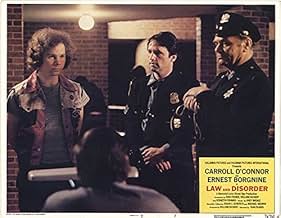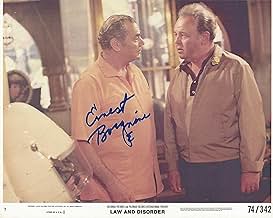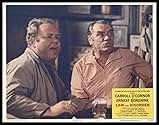NOTE IMDb
6,3/10
357
MA NOTE
Ajouter une intrigue dans votre langueIn crime-ridden 1970s New York City, cops Willie and Cy have had enough. Along with other disgruntled people, they decide to take matters into their own hands - only to realize too late that... Tout lireIn crime-ridden 1970s New York City, cops Willie and Cy have had enough. Along with other disgruntled people, they decide to take matters into their own hands - only to realize too late that they're in over their heads.In crime-ridden 1970s New York City, cops Willie and Cy have had enough. Along with other disgruntled people, they decide to take matters into their own hands - only to realize too late that they're in over their heads.
- Réalisation
- Scénario
- Casting principal
Joseph Ragno
- Peter
- (as Joe Ragno)
Edward Grover
- Capt. Malloy
- (as Ed Grover)
William Richert
- Desk Sergeant
- (as Bill Richert)
Avis à la une
I thought this was a decent film; not a classic, but entertaining enough. The basic premise for me is that sometimes you get in over your head trying to be something that you are not. Guess you'd call this a dark comedy. Excellent acting, gritty scenes of New York life when it wasn't so pleasant, and a shockingly brutal ending makes this worth a look.
It has been many years since I saw this on TV. Two regular Working class Joe's, Ernest Borgnine and Carrol O'Connor, decide to formulate their own Volunteer Police force in their NYC neighborhood. Fed up with the rampant crime that pervades their area, both of these two buddies eventually learn they are in over their heads.
Carrol O'Connor is always entertaining, especially when he rides on the Coattails of his famed character from "All in the Family" in a more subtle version. It's really hard to shake off that character, especially in 1974 when the sitcom had reached the height of its popularity.And with his equally tough and gruff friend, Ernest Borgnine, we are hoping these two will become heroic bad ass renegades that make a difference in cleaning up the streets. But things just don't turn out that way. Willie, Carrol O'Connor, gets discouraged by the job too soon before his irascible partner (Cy), Ernest Borgnine, grows increasingly frustrated into madness. The casting of these two is correct. But here their chemistry barely makes this drab film watchable. Unfortunately, O'Connor's wife is played by a much younger woman, Ann Wedgeworth, surpassing credulity. And would you accept Ernest Borgnine as a beautician? The crusty old-school humor with personal barbs, racial epithets and vulgarity may put off modern audiences. This forgotten film is a product of its time.
Several scenes and one liners are memorable, but the treatment of the subject matter is too farcical to be taken seriously. A scene in a diner with Willie and his wife is inappropriately downbeat and bizarre. An awakening moment occurs when the buddy wannabee cops are driving the town in their makeshift patrol car. Cy notices a nearby crime scene, "hey let's go handle it. we're cops now aren't we?" "I don't know what the hell we are!", exclaims a confused Willie. And this is where the hope for an adventurous drama goes downhill. The supporting cast is filled with farcical caricatures which undermines the severity of the situation the main characters are in, leaving us duped and soured by the outcome of the final scenes. This was a strange attempt for a Black comedy that didn't quite fly.
It's a weird thing about this comedy-drama. I first saw it as a kid back in 1975 where it played almost constantly on HBO and was one of the first movies I ever recall seeing on cable TV. At the time I thought it was damn funny and ever since it became somewhat of a lost film until Anchor Bay released it to DVD several years ago. I couldn't wait to see it again. But when I finally revisited it on disc, I'd found that much of the magic had gone and I didn't think it held up quite as well. It's worth watching for sure if you're a fan of Carroll O'Connor or Ernest Borgnine, but still stacks up as kind of a slightly lost opportunity.
In this movie, O'Connor is a cab driver (and doing his usual Archie Bunker routine even though I think he was trying to prove he wasn't typecast) and Borgnine is his longtime best friend and a struggling hairdresser who owns his own salon (how's that for bizarre casting?). Karen Black is cast as Ernie's ditzy and belligerent employee, the best hair stylist he's able to find. Dwelling with their heads just barely above water in a typical '70s crime-infested New York City, the men become fed up with it all and decide to become auxiliary cops in order to help straighten the neighborhood out from the wrath of drug dealers, burglars and street scum. They get more than they bargained for in the end, which is the best part of the film, and a very strong climax.
While this team-up would seem to be a sure-fire winning combination and set-up, the "story" as it's presented is practically non-existent and all over the place, which is kind of a shame. Golden moments and funnies do show up in odd places, but these share the screen time with all sorts of plot holes and different, undeveloped ideas. Worth a watch anyway if you can see it, but this could have been a lot better. **1/2 out of ****
In this movie, O'Connor is a cab driver (and doing his usual Archie Bunker routine even though I think he was trying to prove he wasn't typecast) and Borgnine is his longtime best friend and a struggling hairdresser who owns his own salon (how's that for bizarre casting?). Karen Black is cast as Ernie's ditzy and belligerent employee, the best hair stylist he's able to find. Dwelling with their heads just barely above water in a typical '70s crime-infested New York City, the men become fed up with it all and decide to become auxiliary cops in order to help straighten the neighborhood out from the wrath of drug dealers, burglars and street scum. They get more than they bargained for in the end, which is the best part of the film, and a very strong climax.
While this team-up would seem to be a sure-fire winning combination and set-up, the "story" as it's presented is practically non-existent and all over the place, which is kind of a shame. Golden moments and funnies do show up in odd places, but these share the screen time with all sorts of plot holes and different, undeveloped ideas. Worth a watch anyway if you can see it, but this could have been a lot better. **1/2 out of ****
8tavm
During the hiatus of "All in the Family", Carroll O'Connor starred in this feature film about a couple of New York guys who join the auxillary police force in order to clean up the neighborhood. I'll just say this film meanders quite a bit with many comic interludes of which some of the funniest involves Carroll's co-star Ernest Borgnine. Karen Black is also a hoot as Borgnine's not-so-helpful hairdressing assistant. The way it all ends is quite bittersweet. So on that note, I highly recommend Law and Disorder. P.S. This review is dedicated to the late Ann Wedgeworth-playing O'Connor's wife here-who passed a few months ago.
Basically this was a film about a couple of blue collar NYC guys that are fed up with their city. They are great friends and organize an auxiliary police force. Getting caught up in this venture, they take this way too seriously and like to believe they are real cops. Gradually , they become out of control. This film had some of the funniest moments but out of nowhere, reality would hit. I liked the film and felt it was a very creative effort. Some wonderful scenes featuring Karen Black , in what may have been her best performance, as an over the top hairdresser. You also had an actor named J. Frank Lucas as a flasher who was funny. Perhaps the best character in the film was Gary Springer billed as the F.U. Kid. I am not making this up folks. It is right here on IMDb. The couple scenes Mr. Springer participated, were worth the price of admission, back in the day. In summation, I would say this is a dramady , with more emphasis on comedy than drama. Be prepared for some harsh moments and appreciate the great comic moments, of which there are many.
Le saviez-vous
- AnecdotesCo-stars Carroll O'Connor and Ernest Borgnine would eventually have the shared distinction that for each, one of their most popular roles had been originated by Rod Steiger. In the live TV anthology series The Philco Television Playhouse (1948), Steiger had first played the role of Marty Pilletti in Marty (1953), later played by Borgnine winning the Best Actor Academy Award for Marty (1955). Steiger would later win his own Best Actor Academy Award for playing Chief Bill Gillespie in Dans la chaleur de la nuit (1967), a role that--when the movie was adapted as the long-running TV series In the Heat of the Night (1988), starting its run more than two decades after the original film--would be played by O'Connor, that casting occurring 14 years after this film, at a time when O'Connor was already at his peak of popularity with another iconic television role, that of Archie Bunker on All in the family (1971).
- Versions alternativesIn the Anchor Bay DVD/VHS release, the scene where Cy shows Willie the hot police car he bought is cut a bit. In the original theatrical version, after Cy shows Willie the siren, Cy then shows Willie some stickers he is going to put on the car to make it look like an authentic police car, this part is missing in the home versions.
- ConnexionsFeatured in Trailer Trauma V: 70s Action Attack! (2020)
Meilleurs choix
Connectez-vous pour évaluer et suivre la liste de favoris afin de recevoir des recommandations personnalisées
- How long is Law and Disorder?Alimenté par Alexa
Détails
- Date de sortie
- Pays d’origine
- Langue
- Aussi connu sous le nom de
- Law and Disorder
- Lieux de tournage
- Delancey Street, Manhattan, New York, États-Unis(Willie's argument with bus driver, at Suffolk Street intersection)
- Sociétés de production
- Voir plus de crédits d'entreprise sur IMDbPro
Box-office
- Montant brut aux États-Unis et au Canada
- 1 597 866 $US
- Durée
- 1h 41min(101 min)
- Mixage
- Rapport de forme
- 1.85 : 1
Contribuer à cette page
Suggérer une modification ou ajouter du contenu manquant























